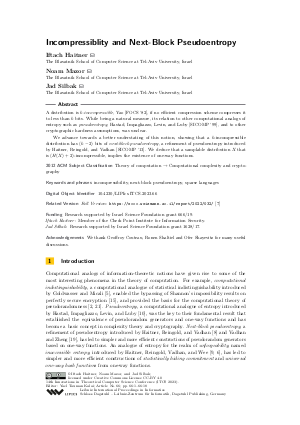Incompressiblity and Next-Block Pseudoentropy
Authors Iftach Haitner, Noam Mazor, Jad Silbak
-
Part of:
Volume:
14th Innovations in Theoretical Computer Science Conference (ITCS 2023)
Part of: Series: Leibniz International Proceedings in Informatics (LIPIcs)
Part of: Conference: Innovations in Theoretical Computer Science Conference (ITCS) - License:
 Creative Commons Attribution 4.0 International license
Creative Commons Attribution 4.0 International license
- Publication Date: 2023-02-01
File

PDF
LIPIcs.ITCS.2023.66.pdf
- Filesize: 0.72 MB
- 18 pages
Document Identifiers
Related Versions
- Full Version https://eccc.weizmann.ac.il/report/2022/032/
Subject Classification
ACM Subject Classification
- Theory of computation → Computational complexity and cryptography
Keywords
- incompressibility
- next-block pseudoentropy
- sparse languages
Metrics
- Access Statistics
-
Total Accesses (updated on a weekly basis)
0PDF Downloads0Metadata Views
Abstract
A distribution is k-incompressible, Yao [FOCS '82], if no efficient compression scheme compresses it to less than k bits. While being a natural measure, its relation to other computational analogs of entropy such as pseudoentropy, Hastad, Impagliazzo, Levin, and Luby [SICOMP '99], and to other cryptographic hardness assumptions, was unclear. We advance towards a better understating of this notion, showing that a k-incompressible distribution has (k-2) bits of next-block pseudoentropy, a refinement of pseudoentropy introduced by Haitner, Reingold, and Vadhan [SICOMP '13]. We deduce that a samplable distribution X that is (H(X)+2)-incompressible, implies the existence of one-way functions.
Cite As Get BibTex
Iftach Haitner, Noam Mazor, and Jad Silbak. Incompressiblity and Next-Block Pseudoentropy. In 14th Innovations in Theoretical Computer Science Conference (ITCS 2023). Leibniz International Proceedings in Informatics (LIPIcs), Volume 251, pp. 66:1-66:18, Schloss Dagstuhl – Leibniz-Zentrum für Informatik (2023)
https://doi.org/10.4230/LIPIcs.ITCS.2023.66
BibTex
@InProceedings{haitner_et_al:LIPIcs.ITCS.2023.66,
author = {Haitner, Iftach and Mazor, Noam and Silbak, Jad},
title = {{Incompressiblity and Next-Block Pseudoentropy}},
booktitle = {14th Innovations in Theoretical Computer Science Conference (ITCS 2023)},
pages = {66:1--66:18},
series = {Leibniz International Proceedings in Informatics (LIPIcs)},
ISBN = {978-3-95977-263-1},
ISSN = {1868-8969},
year = {2023},
volume = {251},
editor = {Tauman Kalai, Yael},
publisher = {Schloss Dagstuhl -- Leibniz-Zentrum f{\"u}r Informatik},
address = {Dagstuhl, Germany},
URL = {https://drops.dagstuhl.de/entities/document/10.4230/LIPIcs.ITCS.2023.66},
URN = {urn:nbn:de:0030-drops-175697},
doi = {10.4230/LIPIcs.ITCS.2023.66},
annote = {Keywords: incompressibility, next-block pseudoentropy, sparse languages}
}
Author Details
Funding
Research supported by Israel Science Foundation grant 666/19.
- Haitner, Iftach: Member of the Check Point Institute for Information Security.
- Silbak, Jad: Research supported by Israel Science Foundation grant 1628/17.
Acknowledgements
We thank Geoffroy Couteau, Ronen Shaltiel and Ofer Shayevitz for many useful discussions.
References
-
Boaz Barak, Ronen Shaltiel, and Avi Wigderson. Computational analogues of entropy. In Approximation, Randomization, and Combinatorial Optimization.. Algorithms and Techniques (APPROX), pages 200-215. Springer, 2003.

-
Manuel Blum and Silvio Micali. How to generate cryptographically strong sequences of pseudo random bits. In Annual Symposium on Foundations of Computer Science (FOCS), pages 112-117, 1982.

-
Robert M Fano. The transmission of information. Massachusetts Institute of Technology, Research Laboratory of Electronics, 1949.

-
Andrew Goldberg and Michael Sipser. Compression and ranking. In Annual ACM Symposium on Theory of Computing (STOC), pages 440-448, 1985.

-
Shafi Goldwasser and Silvio Micali. Probabilistic encryption. Journal of Computer and System Sciences, pages 270-299, 1984.

-
Iftach Haitner, Thomas Holenstein, Omer Reingold, Salil P. Vadhan, and Hoeteck Wee. Inaccessible entropy II: IE functions and universal one-way hashing. Theory of Computing, 2020. Preliminary version in Eurocrypt '10.

- Iftach Haitner, Noam Mazor, and Jad Silbak. Incompressiblity and next-block pseudoentropy. Electronic Colloquium on Computational Complexity, TR22-032, 2022. URL: https://eccc.weizmann.ac.il/report/2022/032/.
-
Iftach Haitner, Omer Reingold, and Salil Vadhan. Efficiency improvements in constructing pseudorandom generators from one-way functions. SIAM Journal on Computing, 42(3):1405-1430, 2013.

-
Iftach Haitner, Omer Reingold, Salil Vadhan, and Hoeteck Wee. Inaccessible entropy i: Inaccessible entropy generators and statistically hiding commitments from one-way functions. Technical Report 2010.05586, arXiv, 2019. Preliminary version in STOC '09.

-
Johan Hastad, Russell Impagliazzo, Leonid A. Levin, and Michael Luby. A pseudorandom generator from any one-way function. SIAM Journal on Computing, pages 1364-1396, 1999.

-
Chun-Yuan Hsiao, Chi-Jen Lu, and Leonid Reyzin. Conditional computational entropy, or toward separating pseudoentropy from compressibility. In Annual International Conference on the Theory and Applications of Cryptographic Techniques (EUROCRYPT), pages 169-186, 2007.

-
David A Huffman. A method for the construction of minimum-redundancy codes. Proceedings of the IRE, 40(9):1098-1101, 1952.

-
Russell Impagliazzo. A personal view of average-case complexity. In Proceedings of the Tenth Annual Structure in Complexity Theory Conference, pages 134-147. IEEE Computer Society, 1995.

-
Russell Impagliazzo and Michael Luby. One-way functions are essential for complexity based cryptography. In Annual Symposium on Foundations of Computer Science (FOCS), pages 230-235, 1989.

-
Claude Shannon. Communication theory of secrecy systems. Bell System Technical Journal, pages 656-715, 1949.

-
Claude Elwood Shannon. A mathematical theory of communication. The Bell system technical journal, 27(3):379-423, 1948.

-
Wojciech Szpankowski and Sergio Verdú. Minimum expected length of fixed-to-variable lossless compression without prefix constraints. IEEE Transactions on Information Theory, 57(7):4017-4025, 2011.

-
Luca Trevisan, Salil Vadhan, and David Zuckerman. Compression of samplable sources. Computational Complexity, 14(3):186-227, 2005.

-
Salil Vadhan and Colin Jia Zheng. Characterizing pseudoentropy and simplifying pseudorandom generator constructions. In Annual ACM Symposium on Theory of Computing (STOC), pages 817-836, 2012.

-
Hoeteck Wee. On pseudoentropy versus compressibility. In Annual IEEE Conference on Computational Complexity (COMPLEXITY), pages 29-41, 2004.

-
Andrew C. Yao. Theory and applications of trapdoor functions. In Annual Symposium on Foundations of Computer Science (FOCS), pages 80-91, 1982.

